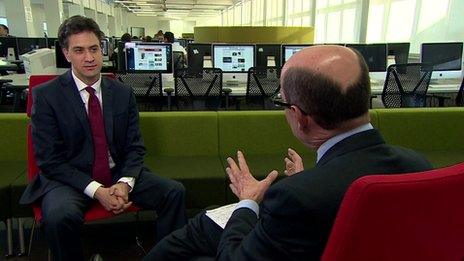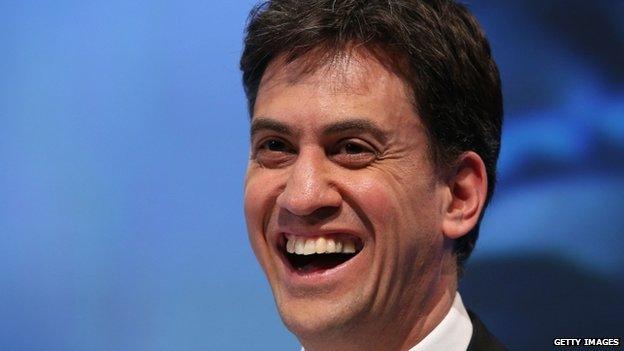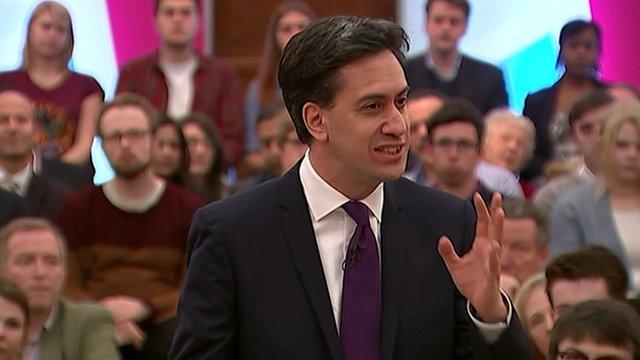Ed Miliband is going nowhere
- Published
Ed Miliband tells Nick Robinson he has not thought of quitting
Forget all the headlines. Forget all the talk. Ed Miliband's staying exactly where he is. Indeed, he told me today that "what doesn't kill you makes you stronger".
On Thursday, he's giving a big speech which the papers will, inevitably, dub a "fight-back" or a "relaunch". Before that, though, he spoke to me on a visit to Harlow college where one student asked him: "How come Labour is doing so poorly?" It was a theme I took up with him.
Nick Robinson: "You attack the Tories, you say they are a mess. Let me put the question that someone here put to you: if they are that bad, why are you doing so spectacularly badly?"
Ed Miliband: "We are in a country where people I don't think are feeling that the recovery is working for them, that the country is working for them, but they are deeply sceptical about mainstream politics and whether it can solve their problems."
"But my job and what I'm going to do is go out and fight for what I believe in, as I did today at Harlow, as I am going to do over the next six months because, look, I passionately believe we can change Britain."
NR: "Some people in the party say to me: 'We like Ed Miliband, nobody doesn't like Ed Miliband but it is set in concrete, the country's made its mind up, it's over, it can't be changed'."
EM: "Absolutely wrong. This is an election we can win, this is an election I'm determined we win and I know we can with the vision we have for how we change Britain."

His vision - put simply - is this. The economy does not work for ordinary people: its rules need changing and only he will do that. But I asked him about today's better news on the cost of living.
NR: "Figures today show pay rising faster than prices - and set to carry on - so what have you got left to say?"
EM: "I welcome any improvement in pay and falls in unemployment. But anybody who believes cost of living crisis is over, that the economy is fixed, which is obviously what this government believes, is totally out of touch with reality."
"If David Cameron wants to say everything is fixed, everything's fine, that that's basis they will fight the election, let him do that. I'm going to be the person arguing for change, who's showing how we can change Britain."
NR:"What does it mean for ordinary voters?"
EM: "It means reforming our banks so they properly serve businesses, it means raising the min wage to over £8 an hour, dealing with the scandal in our country of Victorian working conditions with zero-hour contracts. People not knowing what hours they are doing, and that can go on year after year.
"That isn't a modern economy, and that's what we have to change. I'm the guy who wants change. I'm the guy who will bring change to Britain if I win the election. And I think we do need that change."

Ed Miliband has had little to smile at over the past ten days
One thing Ed Miliband will change is that he will talk more and be seen to talk more about that issue - immigration - which a certain Mrs Duffy of Rochdale raised with Gordon Brown at the last election.
He rules out a cap, but says if he met a modern day Mrs Duffy he would say: "It's not prejudice to worry about immigration. It's understanding that it is based on real concerns about the undercutting of wages, about communities changing quickly, and about the need for people to be integrated and part of the country."
Labour would offer "practical policies that will make a difference, not making promises that we can't keep and based on the fact Labour should be talking about immigration and show that we can do something about it."
He believes Labour can win. He's proud of the policies he's developed, so one question remained.
NR: "When you look in the mirror in the morning, do you see a prime minister?"
EM: "Absolutely, I see someone who will fight for people who wake up every morning and think how do we change this country so it actually works for everyday people again. That's why I came into politics, that's why I joined the Labour Party, that's why I stood for the leadership and that's what I want to do as prime minister."
- Published13 November 2014
